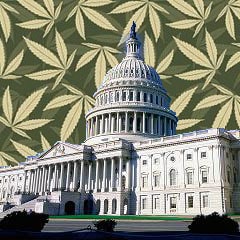 Patient Advocates Appeal Federal Decision to Deny Medical Marijuana to Millions of Americans
Patient Advocates Appeal Federal Decision to Deny Medical Marijuana to Millions of Americans
Notice of appeal filed in D.C. Circuit challenges recent denial to reschedule marijuana for medical use
Washington, DC — The country’s leading medical marijuana advocacy group, Americans for Safe Access (ASA), with the Coalition for Rescheduling Cannabis (CRC), today appealed a recent decision by the federal government to keep marijuana classified as a dangerous drug with no medical value. The appeal to the D.C. Circuit comes just two weeks after the Obama Administration denied a 2002 petition to reschedule marijuana filed by a coalition of patients and advocacy groups. ASA will argue in a forthcoming appeal brief to be filed in the next few weeks that the federal government erred by keeping marijuana out of reach for millions of patients throughout the United States.
“By ignoring the wealth of scientific evidence that clearly shows the therapeutic value of marijuana, the Obama Administration is playing politics at the expense of sick and dying Americans,” said ASA Chief Counsel Joe Elford, who filed the notice of appeal today. “For the first time in more than 15 years we will be able to present evidence in court to challenge the government’s flawed position on medical marijuana.” Although two other rescheduling petitions have been filed since the establishment of the Controlled Substances Act in 1970, the merits of medical efficacy was reviewed only once by the courts in 1994.
Patient advocates argue that by failing to reclassify marijuana, the federal government has stifled meaningful research into a wide array of therapeutic uses, such as pain relief, appetite stimulation, nausea suppression, and spasticity control among many other benefits. In 1988, the government ignored the ruling of its own Administrative Law Judge Francis Young who said that, “Marijuana, in its natural form, is one of the safest therapeutically active substances known to man.”
 Since the CRC petition was filed, even more studies have been published that show the medical benefits of marijuana for illnesses such as neuropathic pain, multiple sclerosis, Alzheimer’s. Recent studies even show that marijuana may inhibit the growth of cancer cells. Earlier this year, the National Cancer Institute, a division of the federal Department of Health and Human Services, added cannabis (marijuana) to its list of Complementary Alternative Medicines, pointing out that it’s been therapeutically used for millennia.
Since the CRC petition was filed, even more studies have been published that show the medical benefits of marijuana for illnesses such as neuropathic pain, multiple sclerosis, Alzheimer’s. Recent studies even show that marijuana may inhibit the growth of cancer cells. Earlier this year, the National Cancer Institute, a division of the federal Department of Health and Human Services, added cannabis (marijuana) to its list of Complementary Alternative Medicines, pointing out that it’s been therapeutically used for millennia.
Ironically, in December of 2010 the Obama Administration issued a memorandum on “the preservation and promotion of scientific integrity” of the executive branch. Yet, the application of such integrity appears to be applied selectively and not with regard to medical marijuana. “With science on our side, we will put an end to the government’s political posturing,” continued Elford, “and force the Obama Administration to adhere to its own stated policy of emphasizing science over politics.”
When the latest petition was filed by the CRC in 2002, eight states had adopted laws recognizing and decriminalizing the medical use of marijuana. Today, sixteen states and the nation’s capitol have passed medical marijuana laws with many more states currently considering proposals to implement similar laws.
Further information:
ASA notice of appeal filed today: https://AmericansForSafeAccess.org/downloads/CRC_Appeal_Notice.pdf
DEA answer to CRC petition: https://AmericansForSafeAccess.org/downloads/CRC_Petition_DEA_Answer.pdf
CRC rescheduling petition: https://www.drugscience.org/PDF/Petition_Final_2002.pdf
White House scientific integrity memo: https://www.whitehouse.gov/sites/default/files/microsites/ostp/scientific-integrity-memo-12172010.pdf
With over 50,000 active members in all 50 states, Americans for Safe Access (ASA) is the largest national member-based organization of patients, medical professionals, scientists and concerned citizens promoting safe and legal access to cannabis for therapeutic use and research. ASA works to overcome political and legal barriers by creating policies that improve access to medical cannabis for patients and researchers through legislation, education, litigation, grassroots actions, advocacy and services for patients and the caregivers.







